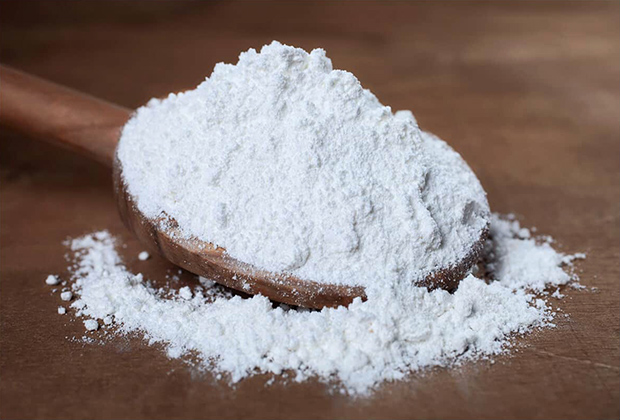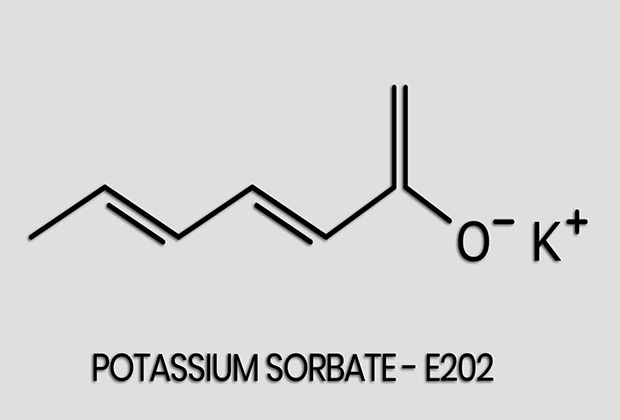Potassium sorbate is a small molecule and powdery substance that can be considered as one of the best preservatives and disinfectants known to date. In this article, we will introduce you to the details of this valuable powder :
Origin of potassium sorbate
Potassium sorbate is produced by combining potassium hydroxide and sorbic acid to make potassium salts. Sorbic acid is naturally present in the form of lactone in berries such as Rojan berries, etc., from which it was first isolated. Some fruits such as cranberries, strawberries and strawberries naturally contain sorbic acid.
Introduction
Potassium sorbate powder is a food preservative with the ability to sterilize, sterilize or disinfect extensively. Potassium sorbate is a salt of sorbic acid that is found naturally in some fruits (such as mountain ash berries). This commercial substance is produced artificially and is called a “natural” chemical (chemically equivalent to a molecule found in nature).
Technical Specifications
Other names for potassium sorbate:
• Hexadienoic Acid
• K-sorbate
• Sorbic acid, potassium salt
Chemical formula: C6H7KO2
Identification Number (CAS): 24634-61-5
Mole mass: 150.22 g · Mol – 1
Melting point : 270 ° C
Appearance
Potassium sorbate is a white crystalline, granular or pellet powder with a neutral taste and odor. It absorbs water easily and expires when exposed to humid air.

How does potassium sorbate act as a preservative?
This powder is formed by the neutralization reaction of sorbate. In addition to solubility, potassium sorbate has the properties of sorbate, which in microbial enzyme systems binds to sulfhydryl groups and thus destroys many enzyme systems.
It is easy to oxidize and brown in air, which can effectively inhibit the activity of yeast, fungi and aerobic bacteria. In addition, it can prevent the reproduction of microorganisms such as Staphylococcus, Botulinum and Salmonella.
In addition, the effect of anaerobic culture of this powder is even better than its sterilization, so it can effectively extend the shelf life of food. Potassium sorbate is more effective than other preservatives such as calcium propionate and sodium benzoate in preventing mold growth in bakery products.
It inhibits microbial growth by altering the morphology, integrity, and function of cell membranes and disrupting transport functions and metabolic activity. This storage mechanism is similar to that of sodium benzoate, but different from that of nisin and natamycin.
What does potassium sorbate do?
Three words: fight bacteria!
Most personal care products are made with a lot of water and a variety of nutrients, which of course creates an extremely hospitable environment for microorganisms.
Worse, this care product may smell and look good, but it is full of bacteria or fungi that are dangerous to your health.
Effective preservatives such as potassium sorbate are vital to ensure safety!
Is Potassium Sorbate Harmful?
Studies on the part used in body care products have shown that it is practically non-irritating and sensitive. In fact, the toxicity of potassium sorbate is close to that of table salt !
In addition, it is included in the Green Chemicals Handbook, approved by the Natural Products as well as Body Care Association. Also, a team of scientists has reviewed and approved their standards over the years.
Structure
The following is the chemical structure of potassium sorbate :

Application
- Potassium sorbate powder as a legal feed additive for animal feed has been approved by the United States and the European Union. Potassium sorbate can prevent the growth of plant parasitic fungi in the diet, especially since it has a very important effect on the formation of aflatoxins.
- Also used in the food containers and packaging materials industry.
- Potassium sorbate is widely used as a food preservative.
Therefore, as mentioned, potassium sorbate powder is widely used in food and animal feed industries as well as in cosmetics, cigarettes, resins, perfumes and rubber industries. But it is mostly used in food storage.
Other foods that contain potassium sorbate :
Cheese
- Dried meat and dried fruit
- Yogurt
- Pet food
- Non-alcoholic beverages
- Cooked goods

Here are some common uses for potassium sorbate:
Non-alcoholic beverages
Food grade potassium sorbate is usually added to diet drinks as a preservative.
Coca Cola
Like sodium benzoate and potassium, potassium sorbate is a common Coca-Cola preservative used to preserve the taste of some non-carbonated, water-containing beverages. You can also find it in the list of ingredients of Sprite Lymonade and Fanta Orange.
PepsiCo
Potassium sorbate is used to maintain the freshness and flavor of some PepsiCo drinks.
Cosmetics
Potassium sorbate is used as a preservative in cosmetics and personal care products. It is a mild preservative that increases shelf life by inhibiting yeasts and molds, and can also replace parabens (preservatives in cosmetics).

Common cosmetics include :
- Sunscreen
- Moisturizers
- Creams
- Shampoos
- Skin and hair care products
Livestock and poultry feed
Potassium sorbate can be safely used as a preservative in livestock and poultry feed such as animal feed for poultry, cattle and sheep, cat food as well as dog food.
Other approved uses
The following food list may also contain potassium sorbate (maximum use of 20 to 6000 mg per kg):
- Ripe cheese and whey
- Spreads, beverage bleaches
- Jams, jellies and marmalades
- Potato paste and pre-fried potato slices
- Chewing gum
- Spices and condiments
- Pre-cooked or processed grains
- Bread and bakery utensils
- Meat products
- Fruit juices
Medical knowledge about potassium sorbate
What are the possible side effects of potassium sorbate?
Although potassium sorbate is approved by the FDA and EFSA and has been declared safe, but each substance has unintended side effects, and sorbate is no exception. Some of these include:
• Allergy symptoms
Genetic toxicity of DNA breakage
• Risk of cancer (improper consumption)
• Migraine
Allergies
Allergy symptoms such as skin and eye irritation may occur in some people who are allergic to potassium sorbate, especially in personal cosmetics.
Does potassium sorbate cause cancer?
No, it is not carcinogenic. However, in the above study, it was stated that excessive consumption of sodium sorbate due to mutagenic and genotoxic effects may also cause cancer.
Is it safe for pregnancy?
It is generally safe to use during pregnancy and is safe, but it is best to consult a doctor before use.
In general, is it safe to eat potassium sorbate?
Yes, potassium sorbate has been approved by the US Food and Drug Administration (FDA) and the European Food Safety Authority (EFSA) as well as the FAO / WHO Joint Food Additives Committee (JECFA) as a safe substance.
Potassium sorbate (E202) is listed in Commission Regulation (EU) No 231/2012 as an authorized food additive and is classified as an “additive other than coloring and sweetening”.
metabolism
Potassium sorbate is a salt of unsaturated fatty acids that are involved in fat metabolism and are eventually converted to water and CO2 in the body.
We hope you are somewhat familiar with potassium sorbate by now. We will be with you soon with more information about this valuable powder.
Related article :
